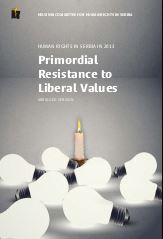Human Rights in Serbia in 2013 – Primordial Resistance to Liberal Values
Human Rights in Serbia in 2013 – Primordial Resistance to Liberal Values
Contributor(s): Sonja Biserko (Editor)
Subject(s): Politics / Political Sciences, Politics, Anthropology, Social Sciences, Education, Law, Constitution, Jurisprudence, Media studies, Human Rights and Humanitarian Law, Political Theory, Communication studies, Government/Political systems, International relations/trade, Security and defense, Electoral systems, Politics and society, Cultural Anthropology / Ethnology, Inter-Ethnic Relations
Published by: Helsinški odbor za ljudska prava u Srbiji
Keywords: Serbia; human rights; transition; socio-politics; economy; regime; elections; Vojvodina; Republika Srpska; regional relations; security system; media; culture and education; war crimes; liberal values; democracy; civil society; Russia;
Summary/Abstract: Thirteen years after the change of the regime (2000) Serbia is still transition-stuck. Reforms have been slow and half-done. Actually, only a synergy of international integrations, responsible political elites and large social movements would have made them possible. And there has been no such synergy since 2000. Economic reforms have been stagnating: Serbia’s economy is still far from an acceptable level of development. Overall progress also hinges on a political system: and that system has not been changed yet in Serbia. And then, the global financial crisis that affected Serbia too set the public opinion against reforms. According to EBRD indicators, reformist moves are highly dependent on the character of political institutions and the strength of economic ones within a political system, on the ratio between human resources and economic grow, and on institutional inclusiveness.
Series: HELSINKI SERBIA - Annual Reports on Human Rights
- Page Count: 74
- Publication Year: 2014
- Language: English
- eBook-PDF
- Table of Content

